Occupy Central
Occupy Central is a civil disobedience movement which began in Hong Kong on September 28, 2014. It calls on thousands of protesters to block roads and paralyse Hong Kong's financial district if the Beijing and Hong Kong governments do not agree to implement universal suffrage for the chief executive election in 2017 and the Legislative Council elections in 2020 according to "international standards." The movement was initiated by Benny Tai Yiu-ting, an associate professor of law at the University of Hong Kong, in January 2013.
OCCUPY CENTRAL - DAY 14: Full coverage of the day's events
PUBLISHED : Saturday, 11 October, 2014, 9:24am
UPDATED : Sunday, 12 October, 2014, 2:39am
Protesters settle in for another night on the streets in Admiralty, as government leaders leave town. Photo: EPA
Protest areas remained calm and peaceful on Saturday after Hong Kong's pro-democracy movement drew thousands of people on Friday night when organisers called for a "new wave" of civil disobedience. With a plan to stay for the long haul, organisers asked citizens to occupy "every inch of the streets" after officials cancelled a scheduled Friday dialogue to ease the political crisis on universal suffrage.
With the city's top leaders away from Hong Kong until Monday, student leaders issued an open letter to President Xi Jinping in which they stressed that the Occupy movement is not a "colour revolution".
Meanwhile a prominent student spokeswoman, Agnes Chow Ting, announced she would be stepping back from the spotlight, saying she was exhausted by the pro-democracy movement.
1.00am: Chief Executive Leung Chun-ying has recorded an interview with local television station TVB that will be broadcast on Sunday.
We're going to pause our live coverage of the Occupy movement now, thanks for staying with us and tune in again at 8am for more breaking news as the protests enter their third week.
12.45am: Here's the full text of the open letter issued on Saturday night by student leaders to President Xi Jinping.
12.35am: More on student leader Agnes Chow Ting, who resigned on Saturday from her role as spokeswoman for Scholarism, a key activist group representing secondary school students. In a statement Chow said she had been exhausted "physically and psychologically" by the pro-democracy campaign, and would take some time to consider her future role in the movement.
11.55pm: More and more tents are popping up in Admiralty and Mong Kok, as protesters dig in for the long haul. The crowd in Mong Kok - the scene of violent attacks on protesters last week - is now about 1,000 people, with speeches and ad hoc debates happening in and around the protest camp. There are thousands still in Admiralty, with more than 300 tents now set up on the highway next to government headquarters.
Meanwhile outside Apple Daily headquarters in Tseung Kwan O, a crowd of about 100 anti-Occupy demonstrators have gathered to protest the Chinese-language newspaper's coverage of and support for the pro-democracy movement.
11.30pm:
11.00pm: More from the open letter sent by the Federation of Students and Scholarism to President Xi Jinping. The letter sets out three key demands:
1. Hong Kong officials need to "answer for their actions, answer to the Hong Kong people" and change their approach to political reform.
2. A fully democratic electoral system with equal rights must be established.
3. The principle of "one country two systems" must be upheld, meaning Hong Kong issues should be dealt with by Hong Kong, and political issues should be dealt with "politically".
Speaking in Admiralty tonight, federation secretary general Alex Chow Yong-kang called on the central government to have faith in the people of Hong Kong. "Don't be afraid of your people, because we aren't afraid of you," he said.
Chow reiterated that the students are "always willing to talk", but said Chief Secretary Carrie Lam appeared to have closed the door to negotiations in her recent comments.
The world would take note if Beijing fails to address the letter, said Scholarism's Joshua Wong Chi-fung. "The whole world is watching how [the Chinese government] will respond," he said, adding that Hongkongers would stay at the protest camps around the city for as long as their demand for democracy is ignored.
10.40pm: Student leaders have issued an open letter to President Xi Jinping, in which they stress that the Occupy movement is not a colour revolution and lay the blame for the current deadlock at the feet of Chief Executive Leung Chun-ying.
The students call on Xi to abide by the principle of "one country, two systems" and allow Hong Kong to resolve its own political problems through introducing full democracy. "The Occupy movement in Hong Kong is definitely not a colour revolution. It is a movement by Hongkongers in pursuit of democracy,” the letter states.
The class boycott and occupation of roads are a response to Leung Chun-ying ignoring the public's demands, the students say. Leung should not be allowed to destroy the system of governance in Hong Kong and "damage the longstanding order".
“Genuine universal suffrage does not mean taking power from the central government. It is a manifestation of [the city's] high degree of autonomy and administrative rights,” the letter adds.
If the central government is "confident", it should not be afraid of Hongkongers electing their own chief executive, the students argue. The introduction of universal suffrage would be a "pioneering achievement" for Xi, they say.
10.00pm: Some images from the protest sites on Saturday, as thousands remain camped out on the streets in Admiralty, Causeway Bay and Mong Kok.
9.45: Mong Kok: A quarrel erupts when several middle-aged men start to speak on a loudspeaker, claiming they want a rational discussion on how to end the Occupy movement.
A crowd of nearly 100 people soon see them as anti-Occupy supporters and jeer them.
Dozens of police officers step in within minutes. The men are escorted away from the Occupy area after they had been there for around 20 minutes.
There are no physical altercations.
9.30pm: Admiralty: As night falls there around 5,000 people at the protest site in Admiralty with the main stage on Harcourt Road commencing the night’s programme, which includes the screening of a documentary film.
9pm: Chief Secretary Carrie Lam Cheng Yuet-ngor is sticking to her guns over the cancellation of Friday’s meeting with the Federation of Students.
“I understand that over the past couple of days many people have expressed the wish that we meet with the students. However, we must make it very clear on the nature of the meeting. For the SAR Government, the meeting must be held on the basis of the decision by the National People’s Congress Standing Committee on August 31, and the goal to implement universal suffrage for the Chief Executive election in 2017.”
Lam was speaking to journalists on the sidelines of a regional conference in Guangzhou.
8.45pm: Mong Kok: Protesters are grouped in several zones inside the Occupy area making speeches advocating their political ideas.
Apart from the ‘green ribbon’ campaigners who want reconciliation between occupy and anti-occupy protesters, students and members of the radical People’s Power are also making their pitch.
Meanwhile, around 50 people are gathered near Mongkok Road to hold a “Mobile Democracy Classroom”, making speeches about the political rights of the disabled.
Speaker Lo Ho-yuen says that most disabled people actually do not support the occupy movement, because the traffic disruptions have caused inconvenience to their daily life and transport to work.
He also says the disabled may care less about whether universal suffrage should be implemented, as the mentally-disabled people are not eligible to vote in elections.
Lo urges the audience to pay more attention to the rights of the disabled and to help them take part in social affairs.
Pedestrians and shoppers continue to flock to the protest area after the dinner – but not everyone is staying to listen to the speeches. The gathering has been peaceful thus far, with around a hundred police officers on duty to maintain order.
8.00pm: Agnes Chow Ting, a prominent student leader, says she has quit her role as a spokeswoman for Scholarism, an activist group representing secondary school students. Chow, 18, cited "stress and exhaustion" as reasons for her stepping down.
7.45pm: Admiralty: There are currently no direct confrontations in Admiralty but a man opposing the protests has managed to stage his own anti-Occupy campaign and has been welcomed - by dressing up as a clown.
The clown, who gave his name as Peter Chan, approached demonstrators in a friendly and cheerful manner, distributing one-page pink flyers with cartoons of happy faces. Protesters, both grown-ups and children, appeared happy to receive them, with some even taking pictures with him.
But flipping to reverse side of the paper, they would find an article critical of the protest. “To say that without a direct election of the head of state or of government, there can be no democracy is simply untrue. Most of the European countries which have no lesson in democracy to receive from anybody do not have a directly elected head of state or government,” it reads.
“The discussion about the electoral reform must be conducted calmly in a proper setting and certainly not in the streets ... Are they mature enough to call off peacefully their protest? How can they continue to deny the working class of Hong Kong their constitutional rights to freedom of movement and access to their work necessary to support their families?”
The article, written by Gerard Millet, a banker and former president of the French Chamber of Commerce in Hong Kong, had been circulated in the business circle in the past few days. The South China Morning Post has earlier verified with Millet that he was the author.
Asked whether he was trying to persuade protesters to disperse by handing out copies of this article, Peter the clown said: “I don’t have a high level of education and do not understand the text well. I just want to face whatever happens with a tolerant heart, no matter things go positive or negative.”
He said he “somewhat volunteered” to come and stopped short of saying whether he was from any organisation. He was accompanied by a woman whom he described as his “manager”. The woman kept taking pictures of him with protesters and even asked the Post reporter to pose for a picture with him.
7.30pm: Mong Kok: The protest area in Mongkok remains peaceful but is becoming busier after dusk, with more pedestrians and shoppers dropping by.
Several of the “green ribbon” campaigners have set up a small stage for the public to make speeches.
‘Green ribbon’ founder Jimmy Ng Chung-wing, works in Mong Kok as an estate agent. He says their campaign is spontaneous and they hope to mediate in the disputes between Occupy and anti-Occupy campaigners.
“Instead of pointing fingers at each other, we want both sides to sit down and understand the stance of the opposite,” Ng says.
Ng fails, however, to outline any further action the group may take in the future.
6.30pm: Admiralty: Civic Party lawmaker Alan Leong Kah-kit, speaking in front of Civic Square on Tim Mei Road, says the government needs to open a dialogue with the students.
“What should be done is being done. [The students] should just keep on doing it,” Leong says with regard to the protesters.
The large number of people who came out on Friday night showed that the support is still intact, he says.
And the students have worked very hard to have some roads re-opened on Saturday, he adds.
6pm: Mong Kok: As the sun sets in Mongkok, the occupied zone has transformed into an all-out pedestrian thoroughfare, making it difficult to distinguish students from local residents and shoppers.
A handful of students are manning the numerous tents on Nathan Road and the atmosphere remains calm and orderly. Less than 100 metres away on Argyle Street, the ‘green ribbon’ camp calls for peace between pro-and anti-occupy protesters
5.30pm: Causeway Bay: Conditions continue to be quiet but protesters have allowed eight trams to leave the Occupy area, and the service between Happy Valley and Causeway Bay has resumed.
However, the route to Central continues to be suspended as Queensway remains obstructed by protest barriers, says Chief Superintendent Steve Hui Chun-tak of the police public relations bureau.
Hui, who repeated his plea for protesters to remove the barriers, says there is an “intentional disruption” of the tram service.
Police have received 20 reports over the past 24 hours, he added, leading to the arrest of six people for common assault or indecent assault.
4.30pm: Mong Kok: A group of people wearing neon green ribbons pinned to their clothes have arrived on the scene and launched a petition calling for "peace in Hong Kong".
Members of the group said they are a mix between the yellow-ribbon movement (Occupy) and blue-ribbon group (anti-Occupy), and are hoping to restore peace in the city.
However, that aim got off to a bad start when an elderly woman who supported the green-ribbon campaign started shouting at an approaching student who was wearing a yellow ribbon. She accused the civil disobedience movement of ruining the city.
"I went over to ask about the green ribbon," the student, surnamed To, said. "One elderly lady saw the yellow ribbon on my bag and just started unloading on me." He was ushered away by police.
3.30pm: Causeway Bay: There's little obvious protest activity here. Shoppers, tourists and passers-by are strolling along the sparsely occupied area on Yee Wo Street.
While in previous days, there had been public lectures on politics, visits from academics and politicans, and sporadic confrontations between disgruntled citizens and the protesters, today the star attractions seem to be the various umbrella installations on the road.
People are particularly taken with a flutter of small yellow origami umbrellas strung together in a line with string, which protesters were seen carefully folding yesterday afternoon.
2.45pm: Mong Kok: A police officer on patrol said the number of 999 emergency calls since the Occupy movement began has actually decreased.
The officer said he believed locals were sympathetic to the demands facing officers in the neighbourhood and thus were only making emergency requests if absolutely necessary.
The officer also took issue with some of the media reports on the conflict in Mong Kok last week, saying they were unfair to police working long shifts in order to keep the peace.
2.30pm: From time to time, police are called upon to control crowds, demonstrations and riots. Here's an infographic by SCMP's Adolfo Arranz on the equipment and strategies available to the Hong Kong force and police around the world. Click here for the high-resolution copy
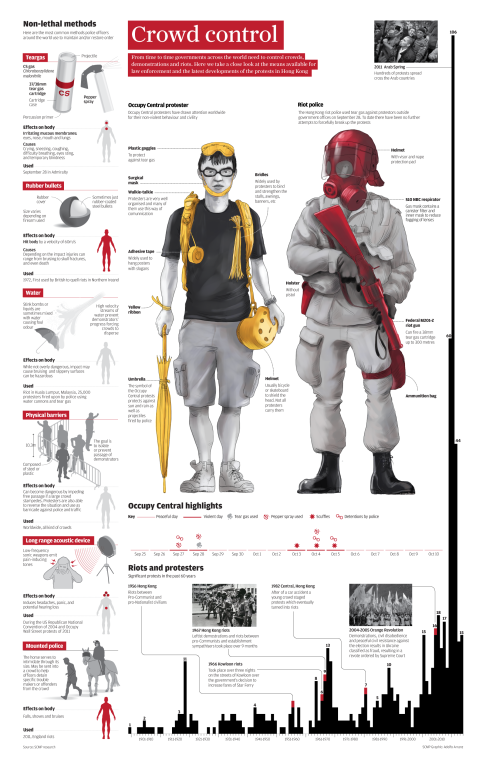
1.45pm: Admiralty: The explosion of artworks and creative protest signs has made the area somewhat of a tourist draw over the past few days, according to visitors.
Taiwanese Chiang Pei-ni, who is in town to visit her aunt, said she made it a point to see the site of the "Umbrella Revolution" today after a trip to the Peak.
Chiang, who works in sales, said she opted to stay as an onlooker during Taiwan's student-led protests in March, dubbed the "Sunflower Movement", where students barricaded parliament and demanded that the government rescind a Beijing-Taipei services trade pact. The protesters perceived that the pact would open Taiwan to Beijing's control.
The Sunflower Movement ended after about three weeks, when President Ma Ying-jeou's government agreed to suspend the pact's review and to require more oversight on future cross-strait agreements. During the Taipei protests, Chiang said she helped out by bringing the protesters bottled water.
"Hongkongers are more united. It is very orderly here while the protest in Taiwan was noisier," Chiang said.
Meanwhile, Guangdong native Ling Yuchen, in his 20s, said it was his first time to visit Hong Kong - and the Occupy protests was one of the reasons that brought him here. "On the mainland, all media reports are against Occupy Central. I support democracy in Hong Kong and I wanted to see what the protest was like," he said.
But he refused to be photographed for fear of losing his job.
1.15pm: Don't miss SCMP's time lapse of last night's rally in Admiralty. Organisers said there were tens of thousands who answered their call to occupy the so-called "Umbrella Square" - the streets around the government headquarters. Police have yet to give a crowd estimate.
12.45pm: Mong Kok: It's also very calm at the protest sites in Kowloon. Around 30 young protesters are taking shelter from the beating sun with tents and umbrellas, as policemen look on.
The barricades are unmanned and tourists are seen strolling around, observing the sit-in.
12.25pm: Admiralty: It's been quiet at the protest site after the thousands-strong rally last night. About 300 tents are pitched at the camp spanning Connaught and Harcourt Roads, and outside the government headquarters. Volunteers have been distributing free breakfasts to those who are awake. Some are still sleeping.
Though protest organisers yesterday called for a "one man, one tent" occupation, Gabriel Chiu Yu-kin, 23, had other ideas. He brought a hammock he purchased on a trip to Brazil and tied the ends to a lamppost and a traffic sign post. It's a more comfortable way to rest and sleep, he said.
Chiu said he had been joining the rallies in Mong Kok since Occupy started but moved to Admiralty last night in response to the organisers' call.
"I find the cultures on the two sides very different. The people in Mong Kok come from more diverse backgrounds and there are more livelihood issues, whereas the atmosphere here is more artistic and academic," Chiu said.
11.35am: Residents in a mainland Chinese village where a rare and historic free election was held in 2012 are holding "umbrella" protests of their own, according to a report by Radio Free Asia (RFA).
Wukan village in Guangdong province launched a series of demonstrations against land grabs and corruption for months in 2011, eventually forcing Communist Party representatives to agree to redistribute farmland, dismiss errant officials and allow an election. More than 6,000 people took part in the vote on February 1, 2012, electing two grass-roots protest leaders as their village chief and deputy village chief.
However, Wukan's experiment with democracy has run into problems. The old guard are slowly being reinstalled in the village's party committee, while elected grass-roots leaders Yang Semao and Hong Ruichao were arrested for alleged bribery, the Post reported previously. Residents fear that the reforms they fought hard for will come to naught.
Now, Wukan residents are "closely following" Hong Kong's democracy movement and some protesters have surrounded the village government offices in recent days, RFA reported yesterday.
"There are a few dozen of them there every day. They are all elderly people. They have put up umbrellas, and have surrounded the place," Hong's sister, Hong Ruiqing, was quoted as saying. But they were outnumbered by police, who parked seven police vehicles nearby, she said.
"Hong Kong now has some similarities with Wukan back then," Wukan resident Zhang Jianxing told RFA. "I hope Hong Kong people do get genuine universal suffrage."
10.30am: Public transport disruptions continue due to protest blockades, but other routes have resumed normal operations, according to the latest Transport Department notice.
Tram services within the Happy Valley loop have restarted after almost two weeks of stoppage. Trams going from Central to Wan Chai (between Ice House Street and Tin Lok Lane) and Causeway Bay (between Percival Street and Victoria Park) are suspended.
Five green minibus lines on Hong Kong Island and Kowloon - 8, 10P, 28, 31X and 30A - have halted, while dozens of others will take diverted routes. CityBus and NWFB routes 13 and 23 have resumed partial service, but will be taking alternative routes in some areas.
The full list of suspended bus routes are: 103P, 113, 201, 3B, 5C, 5P, 5S, 6A, 12, 12A, 12M, 15C, 18, 23B, 26, 629A, 629S, H1, H2
Download the list of bus diversions and partially resumed routes here: Bus Routes
9.35am: An online publication that questioned Chinese state media reports about media tycoon Jimmy Lai has resumed publishing articles following what looked like a news blackout, as punishment for not toeing the party line.
TMT Post, a popular start-up news portal, ran a commentary on October 4 which cast doubt on reports that Lai - an outspoken critic of Beijing and a supporter of the Hong Kong democracy protests - had profited from backing Occupy Central.
State news agency Xinhua and mainland news portals circulated articles citing an unnamed trader's allegations that Lai earned more than HK$1 billion from shorting Hong Kong stocks just days before the protests erupted on September 28 because he allegedly knew about the protesters' plans in advance.
TMT ran a commentary questioning this information, noting that stock regulations would have prevented a move of this scale. However, TMT's article was promptly deleted and it stopped posting any articles for a week.
READ MORE: Deleted article on Jimmy Lai sheds light on Chinese censors' spin
9am: Occupy protesters are off to a running start. A few dozen people joined the first-ever "Umbrella Marathon" to show support for the movement.
The participants, pinning yellow ribbons to their shirts, will start the route at the Mandarin Oriental hotel in Central then head to Wan Chai, before going back to Central via Queensway Road.
Meanwhile, in Mong Kok, protesters this morning unfurled a new banner apparently inspired by a warning flag police used before they fired a hail of tear gas on September 28.
The protest banner warns that, if provoked, demonstrators will counter with a spirited rendition of Happy Birthday. The song has often been used by Mong Kok protesters to ward away irate detractors who are angry about blocked roads, dented businesses or defiance against Beijing.
8.30am: Here's a look at our front page today and all the latest headlines on Occupy Central:
Supporters of the Occupy movement returned to the streets in a massive show of support after the government scrapped a promised dialogue with students.
In an uncharacteristically bold speech, Taiwanese President Ma Ying-jeou yesterday issued a rare direct call to Beijing to introduce democracy. Calling democracy the "right of humankind", Ma said: "Now that the 1.3 billion people on the mainland have become moderately wealthy, they will of course wish to enjoy greater democracy and rule of law."
Kenneth Leung, the legislator who represents accountants, said he had drafted a letter to the UK Listing Authority (UKLA) to "look into the matter in the interests of transparency and compliance".
Expatriates from the democratic West have voiced a range of opinions about Occupy Central almost as varied as their nationalities.
Pro-establishment lawmakers are taking a two-pronged approach to investigating the Occupy Central protests in the legislature amid opposition from their pan-democratic counterparts.
8am: Here's a quick recap of the night's events:
* After days of dwindling numbers, there was a palpable resurgence of support last night for the civil disobedience movement after Scholarism, Occupy Central and the Federation of Students urged a permanent occupation of the so-called "Umbrella Square", or roads near the government headquarters. Tens of thousands, according to organisers' estimates, poured into the streets to protest the government's decision to cancel a planned dialogue on election reform between students and Chief Secretary Carrie Lam.
* The government announced that Leung Chun-ying, Carrie Lam Cheng Yuet-ngor and other high-ranking officials would be travelling to the mainland for meetings with leaders from the mainland's Pearl River Delta region.
* Adding to CY Leung's problems is a request by a lawmaker to launch an inquiry into the HK$50 million that Leung received from an Australian firm. A complaint has been filed to Hong Kong's corruption watchdog, the ICAC, and the case might possibly be investigated by Australian police. This comes as the Australian reporters who broke the news revealed thatLeung's office had demanded they kill the story which Leung's camp deemed "totally wrong" and "libellous".
* Chinese Premier Li Keqiang, who is visiting Germany, said he was confident that "social stability" could be preserved in Hong Kong and stressed that Beijing wouldn't change its "one country, two systems" approach to running Hong Kong.
http://www.scmp.com/news/hong-kong/article/1614307/live-occupy-continues-push-democracy-hong-kongs-leaders-head-mainland
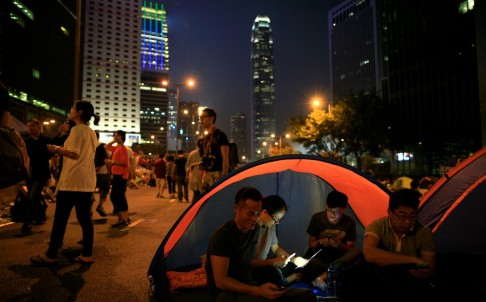
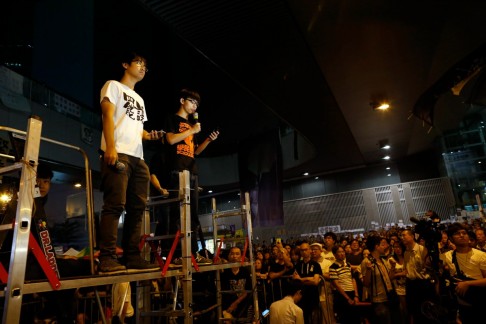
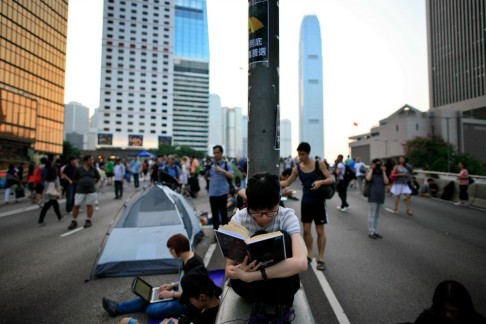
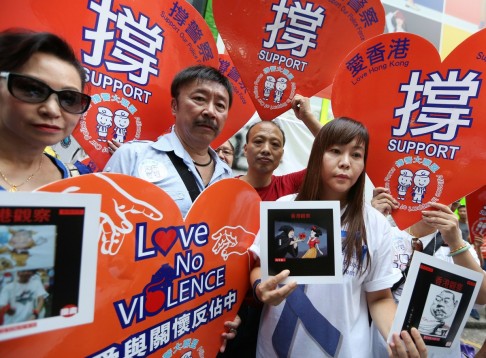
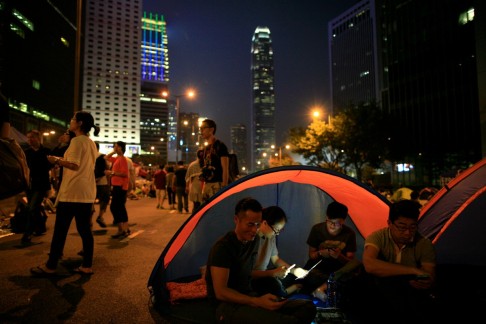
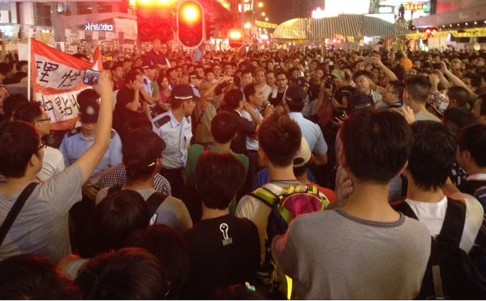
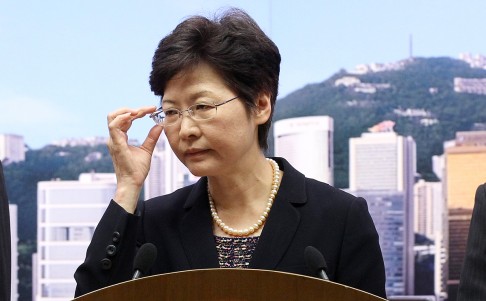
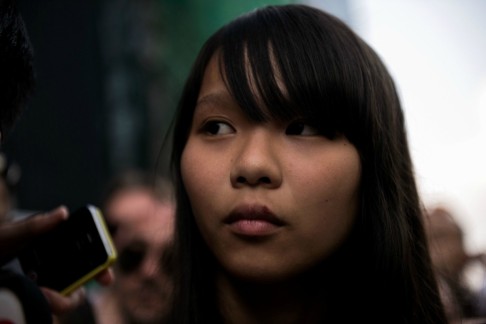
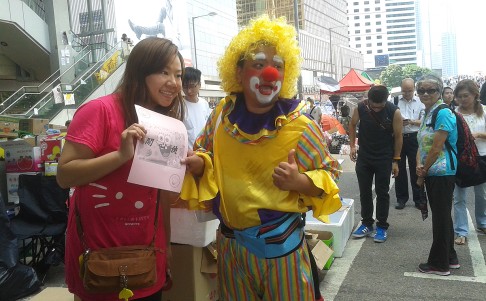
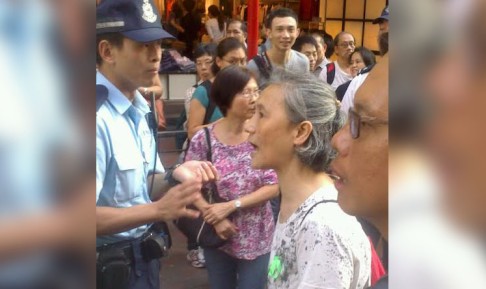
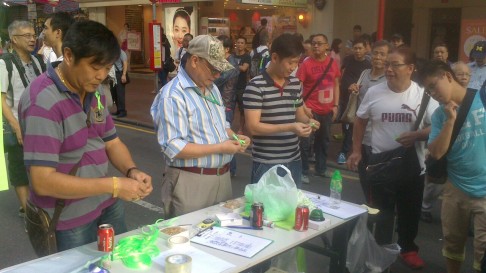
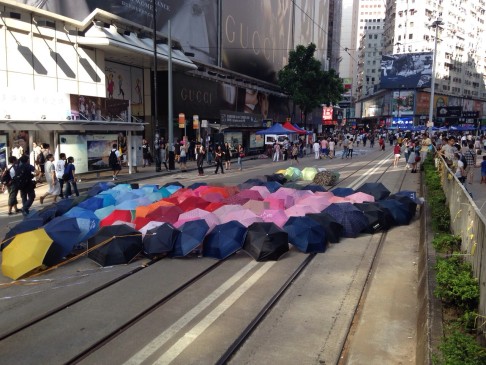
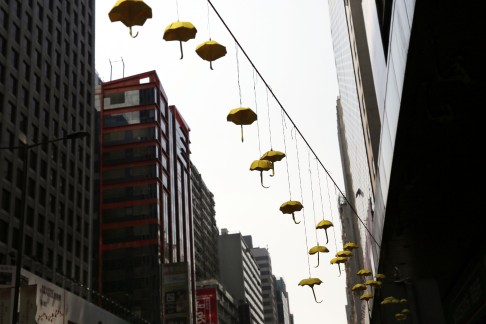
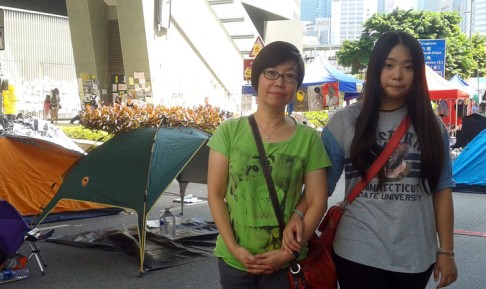

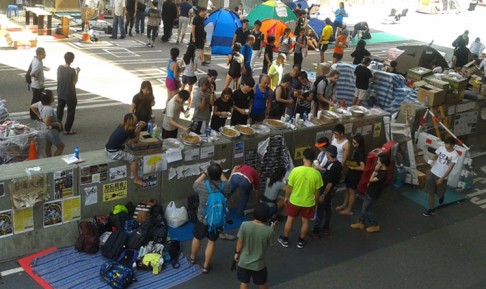
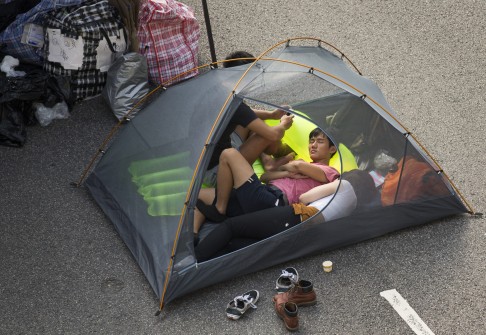
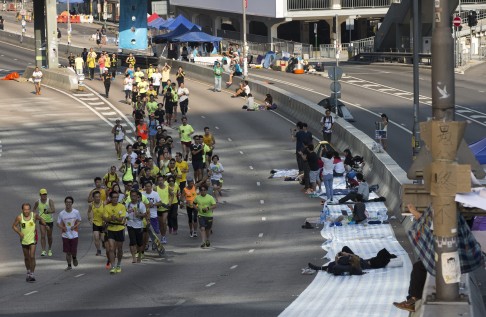
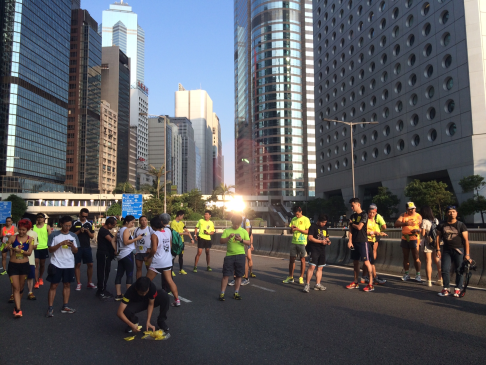
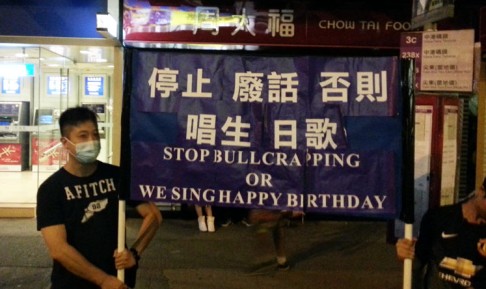
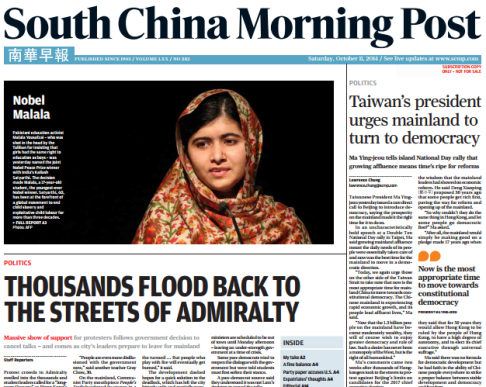
沒有留言:
張貼留言